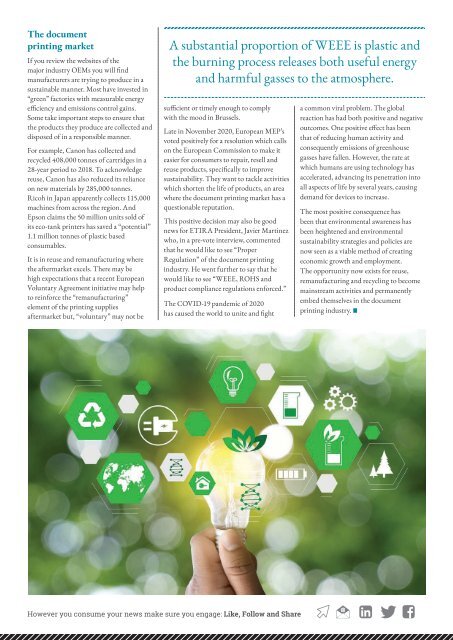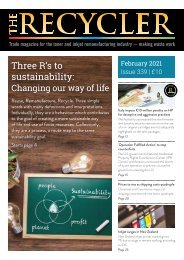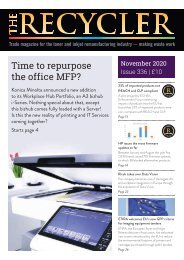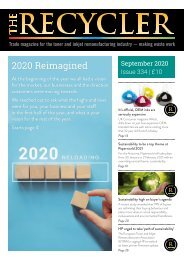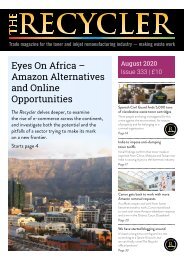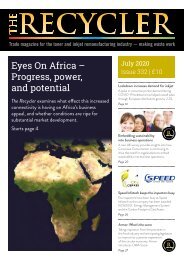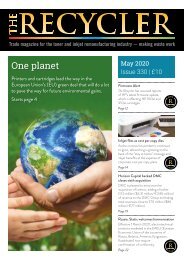The Recycler - Three Rs
You also want an ePaper? Increase the reach of your titles
YUMPU automatically turns print PDFs into web optimized ePapers that Google loves.
<strong>The</strong> document<br />
printing market<br />
If you review the websites of the<br />
major industry OEMs you will find<br />
manufacturers are trying to produce in a<br />
sustainable manner. Most have invested in<br />
“green” factories with measurable energy<br />
efficiency and emissions control gains.<br />
Some take important steps to ensure that<br />
the products they produce are collected and<br />
disposed of in a responsible manner.<br />
For example, Canon has collected and<br />
recycled 408,000 tonnes of cartridges in a<br />
28-year period to 2018. To acknowledge<br />
reuse, Canon has also reduced its reliance<br />
on new materials by 285,000 tonnes.<br />
Ricoh in Japan apparently collects 115,000<br />
machines from across the region. And<br />
Epson claims the 50 million units sold of<br />
its eco-tank printers has saved a “potential”<br />
1.1 million tonnes of plastic based<br />
consumables.<br />
It is in reuse and remanufacturing where<br />
the aftermarket excels. <strong>The</strong>re may be<br />
high expectations that a recent European<br />
Voluntary Agreement initiative may help<br />
to reinforce the “remanufacturing”<br />
element of the printing supplies<br />
aftermarket but, “voluntary” may not be<br />
A substantial proportion of WEEE is plastic and<br />
the burning process releases both useful energy<br />
and harmful gasses to the atmosphere.<br />
sufficient or timely enough to comply<br />
with the mood in Brussels.<br />
Late in November 2020, European MEP’s<br />
voted positively for a resolution which calls<br />
on the European Commission to make it<br />
easier for consumers to repair, resell and<br />
reuse products, specifically to improve<br />
sustainability. <strong>The</strong>y want to tackle activities<br />
which shorten the life of products, an area<br />
where the document printing market has a<br />
questionable reputation.<br />
This positive decision may also be good<br />
news for ETIRA President, Javier Martinez<br />
who, in a pre-vote interview, commented<br />
that he would like to see “Proper<br />
Regulation” of the document printing<br />
industry. He went further to say that he<br />
would like to see “WEEE, ROHS and<br />
product compliance regulations enforced.”<br />
<strong>The</strong> COVID-19 pandemic of 2020<br />
has caused the world to unite and fight<br />
a common viral problem. <strong>The</strong> global<br />
reaction has had both positive and negative<br />
outcomes. One positive effect has been<br />
that of reducing human activity and<br />
consequently emissions of greenhouse<br />
gasses have fallen. However, the rate at<br />
which humans are using technology has<br />
accelerated, advancing its penetration into<br />
all aspects of life by several years, causing<br />
demand for devices to increase.<br />
<strong>The</strong> most positive consequence has<br />
been that environmental awareness has<br />
been heightened and environmental<br />
sustainability strategies and policies are<br />
now seen as a viable method of creating<br />
economic growth and employment.<br />
<strong>The</strong> opportunity now exists for reuse,<br />
remanufacturing and recycling to become<br />
mainstream activities and permanently<br />
embed themselves in the document<br />
printing industry. ■<br />
However you consume your news make sure you engage: Like, Follow and Share


